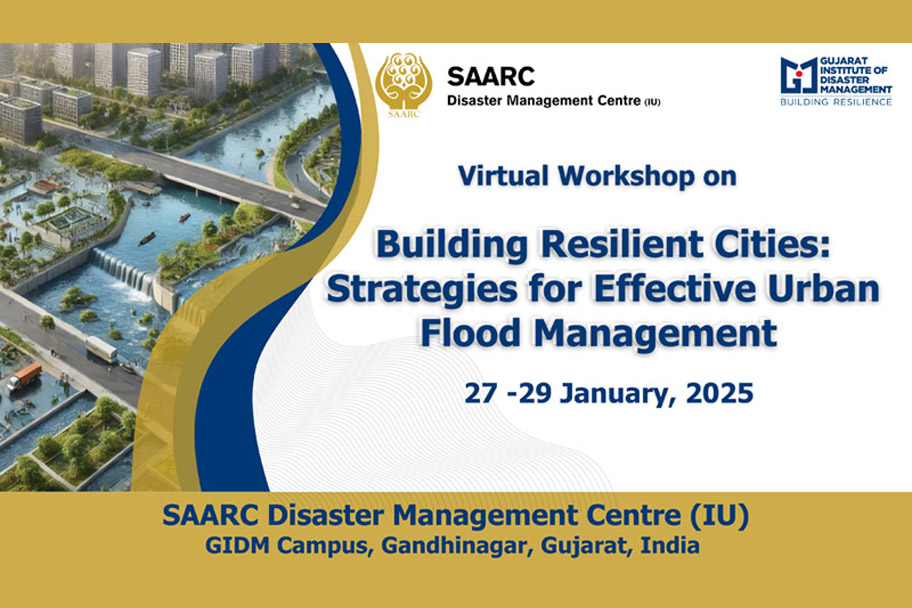Virtual Workshop on Building Resilient Cities Strategies for Effective Urban Flood Management.

| Duration | 27/01/2025 to 29/01/2025 |
| Registration Deadline | 27/01/2025 |
Virtual Mode
Background
Urban flooding in the SAARC region is an escalating threat, driven by a combination of climate change, rapid urbanization, and inadequate infrastructure and governance. As cities continue to expand, informal settlements often develop in flood-prone areas, lacking proper drainage systems, flood protection, and effective urban planning. Combined with extreme weather, such as heavy rainfall and rising sea levels, urban flooding is now a major issue in cities across the SAARC member states. In 2024, more than 50 million people were affected in all of these member states.
The impacts of urban flooding in the SAARC region are devastating, with widespread loss of life, displacement of populations and destruction of homes, infrastructure and essential services like water supply, sanitation and healthcare. The projections show that climate change could increase the economic cost of urban floods in South Asia by up to $23 billion annually by 2050. Vulnerable communities, particularly those living in informal settlements in flood-prone areas, are the most affected, often suffering from poor recovery due to limited resources. In addition, floods result in significant environmental damage, eroding soil, polluting rivers and lakes and destroying vital wetlands that naturally help mitigate flooding. The contamination of water sources also increases the risk of waterborne diseases, exacerbating the public health crisis.
Despite these challenges, many cities in the SAARC region and globally are making strides in reducing urban flood risks and building resilience. These cities are adopting innovative solutions such as nature-based approaches, including green infrastructure (e.g., parks, wetlands, and permeable surfaces), improved urban planning and upgraded drainage systems. This workshop will serve as a platform to learn from these successful practices, share experiences and explore strategies to enhance urban flood resilience. By raising awareness of effective flood management techniques and fostering regional collaboration, the workshop will equip participants with the knowledge and tools necessary to build more resilient cities through both technological and nature-based solutions.
Aim and Objectives of the Training Workshop:
The aim of the Training Workshop on Building Resilient Cities: Strategies for Effective Urban Flood Management for the SAARC Region is to equip participants with the knowledge, tools and strategies necessary to address urban flooding challenges in rapidly growing cities. The workshop will focus on practical approaches to reduce urban flood risks, build resilience and integrate sustainable solutions, including naturebased strategies, in urban planning and disaster risk management.
Objective
- Raise awareness about the growing threat of urban flooding in SAARC cities, its impacts and the urgent need for effective flood management strategies to ensure urban resilience
- Share successful case studies and good practices from cities in the SAARC region and globally that have effectively reduced flood risks and built resilience through innovative solutions, including green infrastructure, improved drainage systems and urban planning
- Highlight the role of nature-based solutions, such as wetlands, green roofs, permeable surfaces, etc. in managing storm water and enhancing urban flood resilience.
- Create a platform for participants to collaborate, share experiences and discuss the challenges and opportunities in urban flood management across the SAARC region.
- Enhance the capacity of participants to design and implement flood risk management plans and urban resilience strategies that integrate both technological solutions and nature-based approaches.
Target Audience
The workshop aims to engage ten senior officials from each of the SAARC Member States, particularly from the Ministry of Urban Development, City Administration, and National Disaster Management Organizations (NDMOs).
Date & Venue
The training workshop will be held virtual mode at the SAARC Disaster Management Centre (IU), Gandhinagar, Gujarat, India, from 27th to 29th January 2025.
| # | Topic | Presenter | View/ Download |
|---|---|---|---|
| 1 | Session1: Extreme Weather Events and Urban Floods: Risks and Opportunities in the SAARC Region | Mr. Sanjay Srivastava Chief of DRR, UNESCAP |
View / Download |
| 2 | Session 2: Smart Cities and Floods: Innovative Techniques for Urban Risk Reduction |
Mr. Kamlesh Yagnik Chief Resilience Officer, Surat, Gujarat, India |
View / Download |
| 3 | Session 3: Community Engagement and Citizen Participation in Flood Risk Reduction |
Dr. Sumedha Dua Sustainable Environment And Ecological Development Society (SEEDS) |
View / Download |
| 4 | Session 4: Building Resilient Urban Infrastructure & Services |
Dr. Umamaheshwaran Rajsekhar Advisor, Urban Resilience, Coalition for Disaster Resilient Infrastructure (CDRI) |
View / Download |
| 5 | Case Study 1: Innovative Approaches to Urban Flood Risk Reduction (South Korea) | Mr. Sanjaya Bhatia Head, UNDRR GETI ONEA |
View / Download |
| 6 | Case Study 2: Rebuilding Resilience: Lessons from Recent Flood to Improve Long-Term Recovery |
Dr. Sekhar L. Kuriakose Member Secretary, Kerala State Disaster Management Authority |
View / Download |
| 7 | Case Study 3: Lessons Learned from Recent Flood: Improving Response and Preparedness |
Mr. Piyush Anand Director, General National Disaster Response Force |
View / Download |
| 8 | Session 5: Integrating Nature-Based Solutions into Urban Flood Management |
Dr. M. B. Joshi Consultant, GIDM |
View / Download |








